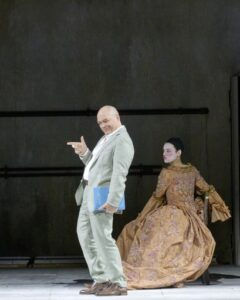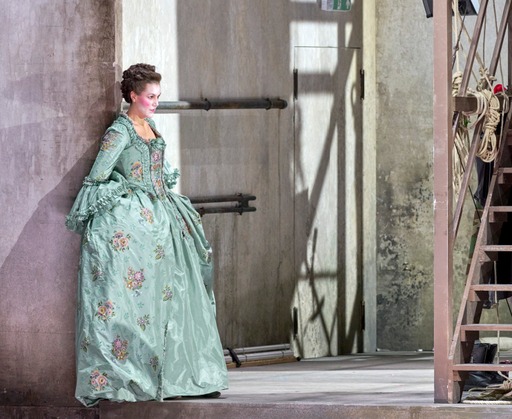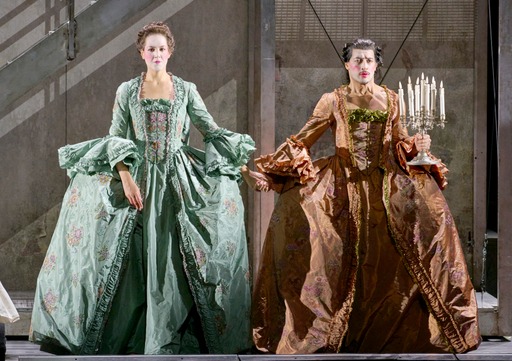Down to earth, there’s a young-looking cast-barely teenagers- creating a hectic pace. They’re all casually dressed, conducting a dress rehearsal: Dorabella (mezzo Emily d’Angelo), in black singlet and jeans, Fiordiligi (star-soprano Federica Lombardi), all denim-blue, vest and jeans. The guys, are always arguing, combative, now over women. Tenor Filipe Manu (Ferrando) is swinging a sword around. Fight, or prove the faithfulness of our loved ones, he challenges Guglielmo (bass-baritone Peter Kellner).- Are they not flesh and blood, like the rest of us? Do they not wear skirts: are they goddesses or women?
Don Alfonso (Christopher Maltman), wearing a silver-grey mohair suit, balding like a film-studio director, is a cut above: he exudes authority, his powerful baritone resonates. ‘Everyone says love exists, but, no one’s proven it.’ ‘Romantic fantasy? Dorabella to Fernando, Fiordiligi to Guglielmo- each is a “phoenix”. But Don Alfonso interjects, ‘What makes you think their hearts are so steadfast?’ And Satan-like, stage-manages a cynical plot. Guglielmo (Kellner in purple t-shirt), they’ll promise to say nothing. Ferrando, now we’ll have fun at their expense. Don Alfonso, is he invited too? Then they’ll drink to the good of love. All three shoot confetti, subverting love.
Fiordiligi, Lombardi in blue jeans, doing Guglielmo’s hair, ‘Have you ever seen a more handsome face? the face of a warrior.’ While Dorabella, d’Angelo all-in-black, sings of Ferrando, just look at those eyes: his gaze! They’re all so happy. In their duet, ‘May Cupid send me endless suffering, should my heart ever yearn for another.’ (Bitterly ironic.)
Good evening, ladies, Don Alfonso introduces himself. Fate can be cruel. What a catastrophe! ‘Steel yourself, my children.’ – Not dead! Wounded?- The King has summoned them to the battlefield.
The two men approach in fatigues- khaki-green camouflage. – (No you can’t leave till my plot is completed, Alfonso reprimands.) All sing, ‘Who in the face of so much grief can go on loving life’. Doubly ironic. While Alfonso, ‘My heart is breaking’, mock-heroic, sends-up young love.
The trio is sublime in its innocence. ‘May the woods be gentle and the seas calm.’ Soave sia il vento. The girls, with Alfonso, wave, Lombardy and d’Angelo in white, chaste, are staring out from the edge of the stage.
 But Alfonso’s diabolic schemer addresses us, singing ‘I’m not such a bad actor after all…‘They’re the kind who change their minds fastest! Placing your trust in a woman is like building on sand!’ The message, that can’t be disguised by any modern director, is misogyny, even in Mozart/Da Ponte’s ‘Age of Enlightenment’.
But Alfonso’s diabolic schemer addresses us, singing ‘I’m not such a bad actor after all…‘They’re the kind who change their minds fastest! Placing your trust in a woman is like building on sand!’ The message, that can’t be disguised by any modern director, is misogyny, even in Mozart/Da Ponte’s ‘Age of Enlightenment’.
Despina, (mezzo Kate Lindsay), avenges women -terrific performance! -as Alfonso’s co-plotter. Otherwise ‘What a wretched life as a chamber maid. (‘They get the chocolate, and all I get is the smell!’)
Dorabella, in black: leave me alone, I’m wracked by inexorable grief! (Smanie implacabili). Should I go on living! Powerful stuff, but (comically) over-the-top. To the battlefield, rallies Fiordiligi, extending the mock-heroic. Scheming Despina assures them, ‘they’ll return crowned with laurels.’ Dorabella innocently asks ‘could I love another if engaged to’ ..But Despina, the hell-raiser, reiterates the cynical refrain Cosi fan tutte, they’re all the same (cast in the same dye)! Despina, faked tears, sings ‘Henceforward let us love for our own pleasure and delight’.
Alfonso alone with Despina- are they having an affair?- ‘You are aware of your misdeeds’, and bribes her. ‘Are the men young, do they have money,’ she asks. Alfonso tells her, victory is theirs (if Fiordiligi hasn’t recognised her!)
Cosi least popular of the Da Ponte/Mozart operas, was especially scandalous for its time (1790), through its immorality- adultery, anti-religiousness, especially Act2’s mock marriages. But post-Victorian prudery, modern audiences are uncomfortable with Cosi’s misogyny, the exploitation of ‘gullible’ women. But have they really been duped? Barry Kosky, Vienna State Opera’s director, sees Mozart’s opera as a play-within-a-play; Fiordiligi and Dorabella may have overheard Alfonso’s intrigue- being a troupe of actors- and played along. And can’t help falling in love. However, the problem with Kosky’s Act 2 is that it’s over-theatrical. The trendy transvestism is unnecessarily confusing.
The disappeared suitors return, disguised, in fancy dress, wearing masks. They approach the women aggressively, reinforcing piratic, oriental stereotypes.(‘The Abduction from the Serail’.) Fiordiligi’s at first faithful: ‘our hearts remain constant’. Lombardi, ever more emotional, ”only death can extinguish our love.’ Tremendous! Lombardi, a very fine soprano – she drinks from her water bottle- then collapses in her passion.
Kellner/Guglielmo now in grey frockcoat, his rich baritone seductive, ‘Make us happy, loving us, and we will make you delirious with joy.’ Look into our eyes, we’re men, flesh and blood! (their other identities far away.) -Are they laughing?- Alfonso, aside, But your laughter soon turns to tears.
Ferrando/Manu sings lyrically, the gentle breath of our loves will quicken our hearts, Manu, jet-black hair tied-back, pirate-like in swashbuckling white shirt. Maltman’s Fellini-like Alfonso-sings, ‘in this glorious moment of sublime beauty and spiritual peace’. Fiordiligi, Dorabella, on opposite ends of the stage, duet, ‘My fate was changed in just a moment!’
The girls actually hit their suitors with real punches. Dorabella pulls Ferrando’s clothes off. Alfonso, gloats in triumph.
Outrageous! The ‘foreign suitors’ lie at their women’s feet – threatening to take poison. And with trembling hands, stroke their legs, arousing themselves. Then they lie like dead bodies on stage. Despina’s ridiculously disguised emergency-rescue worker, viz-yellow and red, carries oxygen cylinders.
Lindsay’s Despina’s aria is a show stopper. Despina’s advice to the ladies – now in luxurious, period gowns- as to ‘What would their fiances say?’- ‘It’s not the same as being unfaithful’, she sings, to get them to break their vows.
As the couples sit wordless, Alfonso incites: ‘You must encourage them. He wants what he may do!‘
They remove their wigs, Guglielmo (Kellner) now with Dorabella, d’Angelo short black-haired. Guglielmo rhetorically flourishes, ‘I give my heart’…But Dorabella won’t take it. It’s no longer hers to give..Fiordiligi now with Ferrando in the wife swap. Lombardi, appeals to Cupid, in her powerful aria, Per pieta, this was punishment for her guilt. It is madness. Have pity, forgive a soul’s errors. Lombardi, thrilling, received terrific applause.
But the men play their macho games. Ferrando, No doubt about it, he knows her (Fiordiligi’s) soul so well. But Guglielmo, she gave me her locket as a token! These two guys, still arguing, are now wrestling in their corsets!
Guglielmo aria (la fate a tanti) distills the opera’s misogyny and sexism; he loves the fair sex, but deceit comes so easily to you! Whereas Manu’s soft tenor, emotions confused, will take revenge. Bravo, eavesdrops Alfonso, that’s what I call fidelity!
The women get off with their new lovers, Kellner and Manu well-developed, sexy young guys, after all. We see Ferrando atop Fiordiligi, pulling off her petticoats. ‘After so many sorrows, let’s delight in sweet pleasures.’ Guglielmo sits distraught. Alfonso, sings, ‘love them, take them as they are’. Maltman, in his aria, everyone accuses women, they’re are all alike, Cosi fan tutte
A candle-lit table, smartly-dressed, dark glasses, d’Angelo and Kellner in white, face Lombardi and Manu in black. Happy who sees the positive side. Kosky dispenses with Mozart/da Ponte’s conventional ‘reconciliation’, but, embalming, Mozart’s music still rings in our ears. © PR 26.6.2024
Photos: Christopher Maltman (Don Alfonso), Kate Lindsey (Despina) © Michael Pöhn/ Wiener Staatsoper



Enjoyed reading this, very good stuff, thanks.